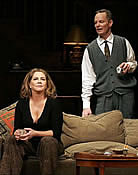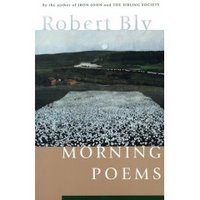I just got back from seeing a performance of "Who's Afraid of Virginia Woolf?" starring Kathleen Turner (with a show-stealing performance by Bill Irwin, who won a Tony for the role in 2005). The play, written by Edward Albee, pulls no punches. One thing that I admire about playwriting is its ability to express anger--more so than prose, certainly more so than poetry.
 Something about the give-and-take of pure dialogue allows tension to build in a unique and palpable way. Anger, in poetry, tends to come across as mere orneriness (I'm thinking of Bukowski, and even some Tony Hoagland). In fiction, anger is almost always couched in artful, but distancing, analysis. Anger on stage can be legitimately intimidating. Says Martha: "Look, sweetheart, I can drink you under any goddamn table you want, so don't worry about me." Says George: "All I said was that our son, the apple of our three eyes--Martha being a cyclops..."
Something about the give-and-take of pure dialogue allows tension to build in a unique and palpable way. Anger, in poetry, tends to come across as mere orneriness (I'm thinking of Bukowski, and even some Tony Hoagland). In fiction, anger is almost always couched in artful, but distancing, analysis. Anger on stage can be legitimately intimidating. Says Martha: "Look, sweetheart, I can drink you under any goddamn table you want, so don't worry about me." Says George: "All I said was that our son, the apple of our three eyes--Martha being a cyclops..."The play was at the Kennedy Center, and I was lucky enough to have access through my boss's "Circles" membership, which is an annual support program independent of any one show. I suppose the closest parallel in the literary world would be purchasing a "subscription" to a press's yearly crop of books, which I think is a splendid and under-utilized idea. If you're interested, I wholeheartedly recommend such programs at Ugly Duckling Presse and No Tell Books. Not only are you supporting individual creative works, you're investing in the creative and editorial vision of an independent press.
While I'm rambling: If you're looking for vivid nonfiction, try "Sweet and Low" by Rich Cohen. One of the few nonfiction books where I was sad when I ran out of pages to read. Written by a disinherited grandson of the man who invented Sweet n' Low (both formula and packets), it's a story of Jews coming to Brooklyn and making good; the science and marketing of sugar; our commercialized obsession with obesity; a family fortune, squandered; a daughter, disowned; and some mafia drama thrown in for good measure. Funny, real, and a damn good story.

